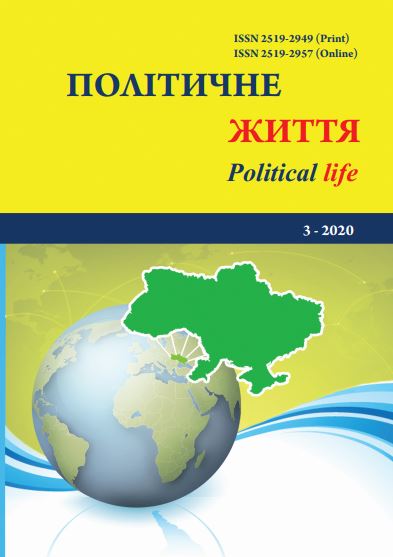Emotionality and political interrelations in a digital non-official discourse (cases of Ukraine and Russia)
DOI:
https://doi.org/10.31558/2519-2949.2020.3.9Keywords:
digital political discourse; digitalization; Ukraine; Russia; political emotionsAbstract
A comparative analysis of Ukrainian and Russian non-official political discourses is presented in the paper. Indicators of emotionality and political interrelations intensity are considered. Political texts of online-media «Ukrainska Pravda» and «Lenta.ru» were used for the research. Period: 2005 – 2019. The indicators were calculated with computer programs (Python language). The difference between the two discourses was observed in 2005-2013. In Ukraine political interrelations intensity indicator is larger, however has been decreasing from 2005 (1,4 – 0,9), in Russia the indicator is much smaller (0,41-0,47). In 2014-2015 in Ukraine the indicator decreased to 0,86-0,88, and in Russia an insignificant growth was observed. This may be explained with information policy change of the Russian mass media because of the «hybrid» war. The general trend in Ukrainian political discourse is decrease in political interrelations intensity, which is interpreted as being a reason of constant non-official mass media discourse digitalization. There is one more difference between the two discourses – in the emotionality indicator. High numbers (0,35-0,42) in Ukraine in 2005-2013 and low ones in Russia (0,19-0,22). And the positive correlation is found between political interrelations intensity indicator and emotionality in Ukraine. And there is no such correlation for Russia, thus political interrelations in the country don’t provide emotions. After 2014 emotionality indicators are almost the same (for Ukraine decrease of the indicator, for Russia – increase). And one more difference is in emotional level of texts about political actors (the countries’ presidents). Here to 2013 a significant difference is observed with high emotionality of messages about Yuschenko and Yanukovych (however in the case of the latter constant decrease of the indicator is observed). In the times of Poroshenko low numbers are discovered, however, in 2019 the largest indicator is fixated. In Russia the less emotional period is for Medvedev, this shows the imitative character of the power change in the country, and from 2014 the indicator growth is observed. Thus, in the first period of digitalization, emotionality and political interrelations intensity indicators seems to be significant to differentiate the authoritative (Russian) and transitive (Ukrainian) regimes.
References
Балабан Р. Політичний режим в Україні в аспекті суспільних цінностей. Наукові записки Інституту політичних і етнонаціональних досліджень ім. І. Ф. Кураса, 2012. № 6. С. 253-268.
Вайс М., Померанцев П. Повелителі брехні: інформація, культура та гроші на службі Кремля. Критика. URL: https://krytyka.com/ua/articles/povelyteli-brekhni-informatsiya-kultura-ta-hroshi-na-sluzhbi-kremlya (дата звернення: 10.11.2019)
Дейвіс Н. Новини пласкої землі. Київ: Темпора, 2011.
Євтушенко О. Політичний режим та його роль у регулюванні взаємовідносин суспільства й держави. Наукові праці [Чорноморського державного університету імені Петра Могили комплексу "Києво-Могилянська академія"] Серія : Політологія, 2016. № 284(272), 12-16.
Мацишина І. Конструювання політичної реальності України. Вінниця: ТОВ "Твори", 2019.
Мацієвський Ю. Між авторитаризмом і демократією: політичний режим після "помаранчевої революції". Політичний менеджмент. 2006. № 5, 18-32.
Моісеєнко Д. Політичний режим постсоціалістичної України як елемент форми перехідної держави. Публічне право. 2016. № 4, 231-238.
Пантелейчук І. В. Політичний режим в Україні: проблеми демократичного транзиту. Актуальні проблеми державного управління. 2010. № 2, 282-289.
Померанцев П. Нічого правдивого й усе можливе. Львів: Український католицький університет, 2015.
Рудич Ф. М. Політичний режим та народовладдя: методологічний контекст. Наукові записки Інституту політичних і етнонаціональних досліджень ім. І. Ф. Кураса НАН України. 2010. № 1, 7-26.
Трач А. С. Політичний режим пострадянської України: між поліцентризмом та моноцентризмом. Актуальні проблеми політики. 2015. № 55, 154-162.
Флах К. Г. Влада і злиденність преси . Київ: Академія української преси, Центр вільної преси, 2015.
Штромайєр, Г. Політика і мас-медіа. Київ: Києво-Могилянська акад, 2008.
BBC. Кто владеет СМИ в России: ведущие холдинги. Русская служба "Би-Би-Си". URL: https://www.bbc.com/russian/russia/2014/07/140711_russia_media_holdings (дата звернення: 10.11.2019).
Chadwick A. The Political Information Cycle in a Hybrid News System: The British Prime Minister and the “Bullygate” Affair. International Journal of Press/Politics. 2011. № 16 (1), 3-29.
Csaky Z. Dropping the democratic facade in Europe and Eurasia. URL: https://freedomhouse.org/report/ nations-transit/2020/dropping-democratic-facade (дата звернення: 10.18.2020).
Demertzis N. Political Emotions. In The Palgrave Handbook of Global Political Psychology / P. Nesbitt-Larking, C. Kinnvall, H. Dekker – editors. Basingstoke: Macmillan Publishers Limited, 2014, 223-241.
Gel’man V. Authoritarian Russia Analyzing Post-Soviet Regime Changes. Pittsburgh: University of Pittsburgh Press, 2015.
Gibson J. A crisis of relevance. Columbia Journalism Review. URL: https://www.cjr.org/special_report/ news-janine-gibson-newspapers-audience.php (дата звернення: 10.18.2020)
Hutchison E., Bleiker R. Theorizing Emotions in World Politics. International Theory. 2014. № 6 (3), 491-514. DOI: 10.1017/S1752971914000232
Iggers J. Good News, Bad News. Journalism. Ethics and the Public Interest. Boulder, Colo.: Westview Press, 1999.
Pleines H. Oligarchs and Politics in Ukraine. Demokratizatsiya: The Journal of Post-Soviet Democratization. 2016. № 24(1), 105-127.
Robinson N. Institutional factors and Russian political parties: the changing needs of regime consolidation in a neo-patrimonial system. East European Politics. 2012. № 28 (3), 298-309. DOI: 1080/21599165.2012.685629
Suárez E. The present crisis of Western democracy is a crisis of journalism. Nieman Reports. URL: https://niemanreports.org/articles/the-present-crisis-of-western-democracy-is-a-crisis-of-journalism/ (дата звернення: 10.18.2020)
Thompson M. Enough Said: What’s Gone Wrong with the Language of Politics? New York: St. Martin’s Press, 2016.
van Dijk T. A. What is Political Discourse Analysis? Belgian Journal of Linguistics. 1997, № 11 (1), 11-52.
Zamyatin K. Russian Political Regime Change and Strategies of Diversity Management: From a Multinational Federation towards a Nation-State. JEMIE. 2016. 15 (1), 19-49.

